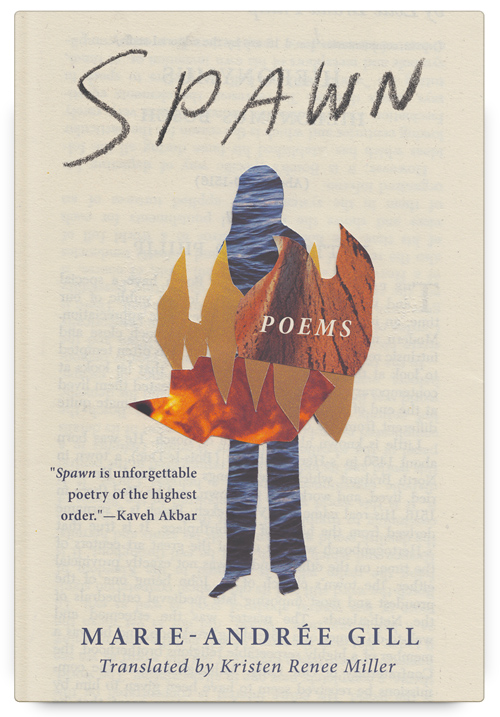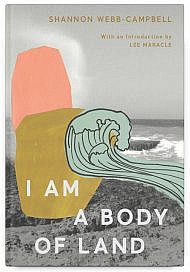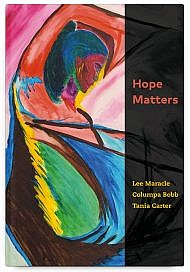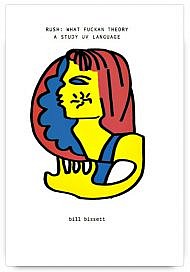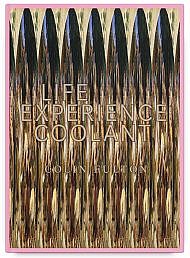Save 25% off all in-stock poetry books from April 17-30, 2025. Use discount code NPM25 at checkout to save.
*Sale excludes forthcoming releases and already discounted subscription packages.
Spawn is a braided collection of brief, untitled poems, a coming-of-age lyric set in the Mashteuiatsh Reserve on the shores of Lake Piekuakami (Saint-Jean) in Quebec. Undeniably political, Gill’s poems ask how one can reclaim a narrative that has been confiscated and distorted by colonizers.
The poet’s young avatar reaches new levels on Nintendo, stays up too late online, wakes to her period on class photo day, and carves her lovers’ names into every surface imaginable. Encompassing twenty-first-century imperialism, coercive assimilation, and nineties-kid culture, Spawn is threaded with the speaker’s desires, her searching: for fresh water to “takes the edge off,” for a “habitable word,” for sex. For her true north—her voice and her identity.
Like the life cycle of the ouananiche that frames this collection, the speaker’s journey is cyclical; immersed in teenage moments of confusion and life on the reserve, she retraces her scars to let in what light she can, and perhaps in the end discover what to make of herself.
Praise for Spawn:
“Marie-Andrée Gill’s Spawn is an epic journey that follows the ouananiche in their steadfast ability to hold: rigid, shimmering, hardened to the frigid waters of winter, in all of its capacities of and for whiteness. Gill’s narrator weaves through their home in Mashteuiatsh and nooks in digital worlds, broken worlds, beautiful worlds, all the while bleeding temporalities into a gallant orality where the northern lights hum with the magnetic fields of Nintendo. Here, the land makes love with the narrator and itself to teach honestly what it means to be held, caressed, and cared for in the most intimate of fashions so that the poems can summon into being a spawn of its own wonder-working dreams: ‘a woman risen up from all these winter worlds, heaped with ice [and] ready to start again’.”—Joshua Whitehead, author of Jonny Appleseed, winner of the Lambda Literary Award
“In any translation there are three texts: the original, the translation, and the text that exists in the gulf between them. What makes Kristen Renee Miller’s translations of Marie-Andrée Gill so remarkable is the way that third ghost-text seems at times to step into our field of vision. Gill writes: ‘we bathe in the malaise / of hot asphalt / waiting for a habitable word,’ and we feel the tension of translation, of using language at all, our doomed human technology. It’s the hardest thing to capture that frustration in language, much less in translated language, and it’s a little miraculous how it’s rendered throughout Gill’s haunting lyric flares. ‘I’m just trying to resemble / this ancient water of which I am the child,’ she writes, and then there it is in the room with us—the weight of the centuries, the weight of the trying. Spawn is unforgettable poetry of the highest order.” —Kaveh Akbar, author of Calling a Wolf a Wolf
“Marie-Andrée Gill undertakes in Spawn a poetry of intimacy and estrangement in technicolor: evoking nostalgia for nature as well as Nintendo, her haunting juxtapositions exist in life cycles of commercial possibilities and ecological impossibilities, of postcolonial globalization and indigenous dislocation. Rendered into crystalline English by poet Kristen Renee Miller, Spawn is an unforgettable work of lyricism and cosmic intelligence.” —Katrine Øgaard Jensen, translator of Third-Millennium Heart, winner of the 2018 National Translation Award
“In these knotty, intense lyrics, Marie-Andree Gill’s Spawn exposes the beauty and cruelty of our fallen, and falling, world. These poems are like small treasures clutched in buried tree roots, preserving ‘the chalky veins’ of ancestral memory pulsing just below our modern hustle. Kristen Renee Miller’s luminous translation gives us a poet who insists on unwinding layers of language—Indigenous and settler, pop-cultural, philosophical, and spiritual—in search of elemental connection: “up close, our animal skin / looks like any other.” —Kiki Petrosino, author of White Blood
Press Coverage:
Marie-Andrée Gill: Poems in Translation from SPAWN —The Common
11 of the Most Anticipated Books by Indigenous Authors For the First Half of 2020 —Sarah Neilson, Literary Hub Book Marks
29 Works of Canadian Poetry to Watch for in Spring 2020 —CBC Books
Figures of Speech: A Review of Spawn —Steven W. Beattie, Quill and Quire
“The most impressive part of this book is how such few words carry such grand emotions, how the poetry seems to build an entire landscape then touch on every part of its poetic world. The “spawn” seems to be both the poetic voice and the poem itself. Through the lyrical transformations, through the linguistic translation, at the end of the book it was I the reader who felt changed.” —Clara Altfeld, The Kenyon Review
“Gill, by contrast, is intimately familiar with violence, but from the side of the victim rather than the perpetrator. She writes about the claustrophobia of life on a reserve (“get me out of these fifteen square kilometres”) and the conditions that have been foisted upon her by a historically rapacious colonial system of governance: “I am a village that didn’t have a choice.” —Steven W. Beattie, Quill and Quire
Native Tongues: Indigenous Poetry Feature —Publishers Weekly
“This collection of poems is exquisite, exploring delicately and deeply the connection between person and place.” —Rachel Daum, ALTA Blog
“The journey of Gill’s lyric speaker is at once relatable in its particulars and distinctively evocative. Miller’s skillful translation makes vivid a landscape and language that will transport readers.” —Publishers Weekly
The CBC Books summer reading list: 40 Canadian books to read this season —CBC Books
“The book takes the life cycle of the ouananiche salmon in Lake Piekuakami as an overarching metaphor, reflecting on confines — those we choose, those chosen for us, and those we don’t realize we have a choice about. Gill contemplates, in small poems surrounded by lots of white space, the struggle of “spawning” and all it represents (instinct, fulfillment, continuance, more), for a young person just stepping over the threshold into independence.” —Stacy Pratt, Anomaly
Meet the 2020 Virtual ALTA Travel Fellows —ALTA blog
Poetry Mixtape #2 by Olivia Lott —Action Books
“Spare and image-driven, the poems in “Spawn” chart a young woman’s coming of age with a captivating mix of lyricism and earthy candour.” —Barb Carey, Toronto Star
“Economy of words. Lyric minimalism, yet substantial in setting and meaning.” —@end.notes (Instagram)
Our Favorite Books-in-Translation of 2020 —Action Books Blog
From Urayoán Noel, Judge for the 2020 Gulf Coast Prize in Translation:
“Marie-Andrée Gill’s spare, luminous micropoems are endlessly surprising, twisting out, into, and unto themselves like complicated lovers. Defiantly fragmentary, these are less petits poèmes en prose than stunning shards of tongues, embodied vernaculars slowly, steadily unsettling grammars. Kristen Renee Miller’s translations retain the elegance and shimmer of the originals while wondrously conveying their knottedness, their syntax of skin. When at last we reach Nitassinan, we are reminded of the worlds poetry documents, but also of the worlds it creates. This is poetry that claims the power to “gnaw the meat off / each day and spit out the pin bones” through a language as unresolved as our decolonial dreams and as necessary as our sovereign desires.”
Ilnu Nation member Marie-Andrée Gill grew up on the Mashteuiatsh reserve in the Saguenay-Lac-Saint-Jean region in Quebec, home to the Pekuakamishkueu community. She is the acclaimed author of three French-language poetry collections from La Peuplade: Béante, Frayer, and Chauffer le dehors. Two of her books have been translated into English by Kristen Renee Miller, including Spawn (2020) and Heating the Outdoors (forthcoming in 2023). A doctoral student in literature, Gill’s research and creative work focus on the decolonial project of writing the intimate. She hosts the award-winning Radio-Canada podcast “Laissez-nous raconter: L’histoire crochie” (Telling Our Twisted Histories), which “reclaims Indigenous history by exploring words whose meanings have been twisted by centuries of colonization.” Gill’s work has been nominated for many awards, including the Governor General’s Literary Award for Poetry, and she is a three-time recipient of the Salon du Livre Prize in Poetry. She has also won two Indigenous Voices Awards, including the Best Published Poetry in French prize for Chauffer le dehors. Also in 2020, Gill was named Artist of the Year by the Quebec Council of Arts and Letters.
Kristen Renee Miller is the incoming Executive Director and Editor-in-Chief of Sarabande Books. A poet and translator, she is the 2020 winner of the Gulf Coast Prize in Translation and the translator of two books from the French by poet Marie-Andrée Gill: Spawn (2020) and Heating the Outdoors (forthcoming in 2023). Her work can be found widely, including in POETRY Magazine, The Kenyon Review, DIAGRAM, jubilat, and Best New Poets. She is the recipient of fellowships and awards from the Foundation for Contemporary Arts, the John F. Kennedy Center for the Performing Arts, and the American Literary Translators Association. She lives in Louisville, Kentucky.

